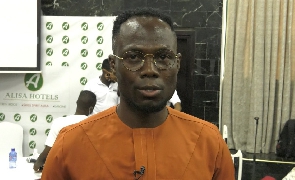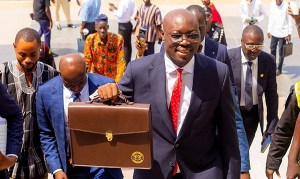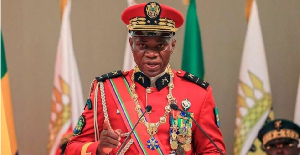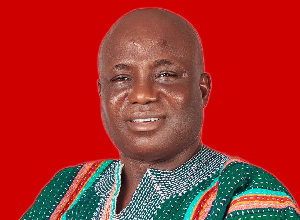…if he fails to restore macro-economic stability
…and retrieve Woyome's ill-gotten booty
The despondency creeping into the Ghanaian social fabric, largely as a result of the country's declining economic fortunes, has continued to deepen even after the Senchi Economic Forum. Many have argued that Senchi has failed to restore hope, and that only changes at the Ministry of Finance; Energy and Petroleum; Bank of Ghana or in a worst case scenario, a change of government can bring back hope.
Ghanaians are not known for voting on issues, but it appears if the difficulties the country is currently going through persist the story will be different in 2016. In a recent opinion survey undertaken by Public Agenda to gauge the mood of Ghanaians in these trying moments, majority of those interviewed blamed the President for the worsening economic situation. Out of 32 people interviewed in the Accra and Tema metropolitan areas, 28 held the President liable for the economic mess Ghanaians find themselves. “If he puts the wrong people in office, he takes responsibility for their failure,” an interviewee pointed out.
Half of those interviewed would want the on-going constitutional review process to make provision for early elections in situations where, based on stipulated indicators, it becomes abundantly clear that a particular government lacks the capacity to manage the economy.
“It is absurd for the constitution to allow the country to be mismanaged for the full term of the Presidential mandate even when the government has clearly demonstrated gross incompetence in fighting corruption and in managing the country's economic fortunes,” said an NGO activist, arguing that “the damage, by the time that president serves his or her full term, would be irreparable.”
Twenty-four respondents, representing 72% of those interviewed said they would have voted out the National Democratic Congress(NDC) if elections were organised today. What is even more revealing in the poll results is not the nominal figures and percentages, but the views assigned for the opinions expressed.
“The exercise of bad judgment” was cited as the topmost reason for the President's declining popularity. Some cited the lump-sum payment of huge ex-gratia awards to MPs soon after the 2012 elections, when the fragility of the economy inherited by Mahama was beginning to emerge, as their greatest disappointment.
Others fingered as “bad judgment,” the President's decision to appoint immature and inexperienced ministers and deputy ministers over capable, tried and tested ones. Some of the respondents argued that the young ones could have been started in their political tutelage as special assistants to understudy the more competent ones. The appointment of Dr Ekwow Spio-Garbrah was welcomed in this regard, even though two of the respondents think he's coming in a bit too late.
Others also said, the presentation of thirteen V8 cross-country vehicles to the National House of Chiefs was bad judgment. They explained that the timing was wrong and has the potential to offend the sensibilities of workers, many of whose salaries had delayed or had not seen any enhancement in the face rising cost of living.
All, except two of the respondents, will however, vote for President Mahama at the next elections if he retrieves the wrongfully paid Woyome and Isofoton judgment debts, and again, if the President demonstrates unquestionable commitment to fighting corruption in his government. This, they said, should reflect in how he handles issues of corruption involving any of his appointees.
The Supreme Court on Tuesday, July 29, by unanimous decision, ordered businessman, Alfred Agbesi Woyome, to refund Ghc51.2million to the State, bringing to an end, the former Attorney- General, Hon. Martin Amidu's long battle to retrieve the supposedly wrongfully paid judgment debt to the State. Though the government has signaled that, it welcomes the court's decision doubts hang over its political will to retrieve the monies. Dr John Kwakye of the Institute of Economic Affairs (IEA) on Tuesday expressed the belief that the retrieval of this and other illegally paid judgment debts such as that of Isofoton will help to substantially ease the fiscal squeeze the government finds its self.
Furthermore, scandals, such as SUBAH, SADA, and GYEEDA appear to have done a fair share of the reputational damage to the Mahama administration. Eighteen of the respondents cited them as evidence of the President inability to fight corruption in his government. They argued that a strong statement in terms of prosecution of those cited in corrupt activities will be enough to convince Ghanaians that he is serious about curbing the menace.
All those interviewed, except three had no party affiliation, suggesting they may be swayed by how well the government handles the grievances expressed in the survey.
General News of Monday, 4 August 2014
Source: Public Agenda













